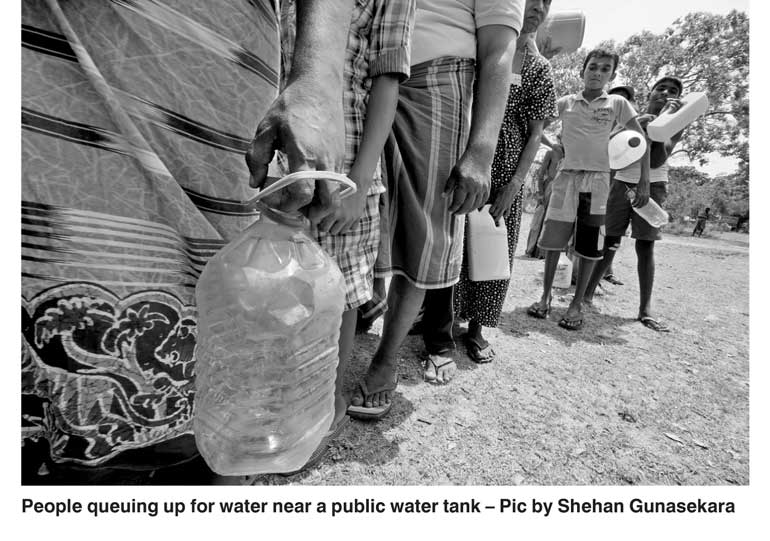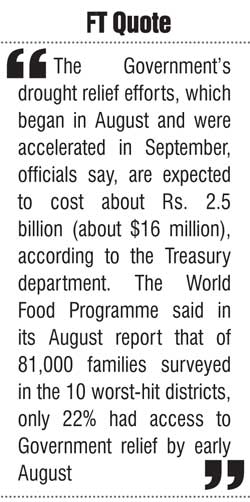Friday Feb 20, 2026
Friday Feb 20, 2026
Saturday, 7 October 2017 00:40 - - {{hitsCtrl.values.hits}}
 By Amantha Perera
By Amantha Perera
Thomson Reuters Foundation: At 52 years old, with two grown children, Newton Gunathileka thought he should be working less by this point. Instead he has never worked so hard – and earned so little.
Gunathileka, from the Sri Lankan village of Periyakulam, in the North Western Puttalam District, is among hundreds of thousands of rural Sri Lankans who have borne the brunt of the worst drought in four decades.
He has not seen any substantial rains on his farm in at least a year and has lost two harvests, resulting in a loss of over Rs. 200,000 ($1,325) – and growing debts. He has now abandoned his two acres of rice paddy land and spends his time looking – mainly unsuccessfully - for other work in 40 degree Celsius heat.
“There is no work. Everyone, big or small, has lost out to the drought,” he said.
According to data released in September by the United Nations, there are hundreds of thousands of households like Gunathileka’s facing serious food security issues in Sri Lanka.
 With rice production for 2017 expected to be the lowest in a decade, “over 300,000 households (around 1.2 million people) are estimated to be food insecure, with many households limiting their food intake and in some cases eating just one meal a day,” the United Nations update said.
With rice production for 2017 expected to be the lowest in a decade, “over 300,000 households (around 1.2 million people) are estimated to be food insecure, with many households limiting their food intake and in some cases eating just one meal a day,” the United Nations update said.
The worst affected areas are the North Western, North Central, Northern and South Eastern Provinces that rely heavily on agriculture. The UN Office in Colombo said that affected households were in some cases limiting their food intake, which was hampering people’s day-to-day lives.
Eating their seed
Gunathileka, who hails from the North Western Province, said his family was now eating some of the rice that he had put away to use as seed for the next growing season.
“For the next month or two we are okay with rice, but we have been limiting eating meat, eggs and vegetables we buy from outside. The other big problem I have is my children’s higher education. If we can’t get a harvest at least by the end of the year both of them will have to work,” he said.
His daughter is taking a course in secretarial work while the son is getting ready to sit university entrance exams. The family now survives on about Rs. 800 ($5) or less a day, and both Gunathileka and his wife earn cash doing whatever work they can find.
The UN report also said that household debt was rising due to the drought. A World Food Programme survey released in August said that debts of surveyed families had risen by 50% in the last year.
“Households reported that the amount of money owed in formal loans has not increased, indicating that families are turning to informal lenders for credit,” the WFP survey said.
Gunathileka said that he was thinking of using the deeds to his paddy rice land as collateral and seeking a small loan from local money lenders.
“The banks will not lend because I can’t show any income. (But) if I don’t get to pay back the money lenders, I lose my land,” he said.
Rain and aid
Government officials said they anticipated the island had weathered the worst of the drought, and rains expected in late October would bring more relief.
Recent rains have dropped the overall number of people affected by drought from 2.2 million a month ago to 1.7 million now, said G.L. Senadeera, Director General of the Government Disaster Management Centre.
He said the Government planned to distribute relief food packs worth Rs. 5,000 ($34) to about 200,000 drought-hit families and provide compensation up to Rs. 8,500 ($56) per acre for harvest losses this year.
The Government’s drought relief efforts, which began in August and were accelerated in September, officials say, are expected to cost about Rs. 2.5 billion (about $16 million), according to the Treasury department.
The World Food Programme said in its August report that of 81,000 families surveyed in the 10 worst-hit districts, only 22% had access to Government relief by early August.
For now, Gunathileka and his wife look up to the sky each time they step out looking for work.
“All we see are clear skies. All we want to see are dark clouds over the horizon,” he said.